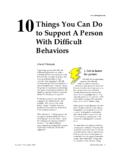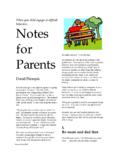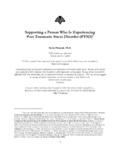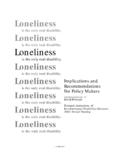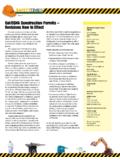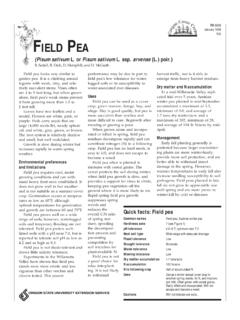Transcription of The Importance of Belonging
1 The Importance of Belonging 1 David Pitonyak The Importance of Belonging David Pitonyak To be rooted is perhaps the most important and least recognized need of the human soul. Simone Weil v. 01 January 2014 The Importance of Belonging 2 David Pitonyak i m a g i n e David Pitonyak 3694 Mt. Tabor Road Blacksburg, VA 24060 540-552-5629 VOICE 540-552-1734 FAX For additional information, visit the imagine web site: Reproducing The Importance of Belonging Permission is granted to download single copies of this handout from the Imagine web site. Should you wish to reproduce the document for distribution or training, please contact David at the above address. Portions of the document are taken directly from other publications: Pitonyak, D.
2 (2002). Opening the Door. In J. O Brien and C. Lyle-O Brien, Implementing Person-Centered Planning: Voices of Experience. Toronto: Inclusion Press. Pitonyak, D. (2002). Toolbox for Change: Reclaiming Purpose, Joy, and Commitment in the Helping Profession. Blacksburg, VA: Imagine. Pitonyak, D. (2002). What Do I Do Supporting a Person with Difficult Behaviors After the Workshop. Blacksburg, VA: Imagine What Do I Do was prepared for and funded by the City of Philadelphia, Department of Public Health. Printing Suggestions The Importance of Belonging is designed to be printed front and back. Please, when replicating, save paper by using both sides. David Pitonyak The Importance of Belonging 3 David Pitonyak We are all longing to go home to some place we have never been a place, half-remembered, and half-envisioned we can only catch glimpses of from time to time.
3 Community. Somewhere, there are people to whom we can speak without having the words catch in our throats. Somewhere a circle of hands will open to receive us, eyes will light up as we enter, voices will celebrate with us whenever we come into our own power. Community means strength that joins our strength to do the work that needs to be done. Arms to hold us when we falter. A circle of healing. A circle of friends. Someplace where we can be free. - Starhawk The Importance of Belonging 4 David Pitonyak Introduction Many people who experience disabilities live lives of extreme loneliness and isolation. Many depend almost exclusively on their families for companionship. Some have lost their connections to family, relying on people who are paid to be with them for their social support.
4 Although paid staff can be friendly and supportive, they frequently change jobs or take on new responsibilities. The resulting instability can be devastating to someone who is fundamentally alone. Bob Perske describes how a person whose life is devoid of meaningful relationships might feel: "We have only begun to sense the tragic wounds that so many [persons with developmental disabilities] may feel when it dawns on them that the only people relating with them -- outside of relatives -- are paid to do so. If you or I came to such a sad realization about ourselves, it would rip at our souls to even talk about it. Chances are some of us would cover it up with one noisy, awkward bluff after another. And chances are, some professionals seeing us act this way, would say we had "maladaptive behavior.
5 " Think about what it would feel like to have even one person come to us without pay, develop a reliable, long-term relationship with us because he or she wanted accept us as we are. Then think of the unspeakable feelings we might possess if -- when others were "talking down" to us and "putting us in our place" -- that kind person could be counted on to defend us and stick up for us as well! Most of us do have persons like that in our lives. But will the day come when [people with disabilities] have them too?" (1) In my view, most people served by the human services industry are profoundly lonely. Loneliness is the central reason why so many are unhappy and distraught. It is not because our instructional strategies are ill-informed or because our planning processes are inadequate.
6 It is not because our medications are in-potent or because staff are untrained. Their suffering results from isolation. As Willard Gaylin has written, To be vulnerable is not to be in jeopardy. To be vulnerable and isolated is the matrix of disaster (2). The Importance of Belonging 5 David Pitonyak The Wrong Questions For years, the human services profession has been pre-occupied with three questions (3): What s wrong with you? How do we fix you? What do we do with you if we can t fix you? The central function of our human services system, in my view, should be to help people who experience disabilities to develop and maintain enduring, freely chosen relationships (4). Why? The Importance of Belonging (5) A sense of Belonging , writes Dr.
7 Kenneth Pelletier of the Stanford Center for Research and Disease Prevention, appears to be a basic human need as basic as food and shelter. In fact, social support may be one of the critical elements distinguishing those who remain healthy from those who become ill. (6) In their 1996 book, Mind/Body Health: The Effects of Attitudes, Emotions and Relationships, researchers Brent Hafen, Keith Karren, Kathryn Frandsen, and N. Lee Smith describe the results of a nine-year study of 7,000 people living in Alemada County, California. The people with many Loneliness is the only real disability I thought, for the longest time, that I had made this quote up on my own, and then someone said they heard it from Judith Snow first. I asked Judith if she had coined the phrase and she said, I wish I had.
8 Years later, someone in Georgia told me that Beth Mount had said it first so I wrote to Beth to see if they were right. She wrote back, Use it and don t worry about making it mine--so much of what we all say and do has been borrowed from our 't worry about crediting me with that which we all know, the power of relationships to heal and make whole. Looks to me like Beth deserves the nod. The Importance of Belonging 6 David Pitonyak social contacts a spouse, a close-knit family, a network of friends, church, or other group affiliations lived longer and had better health. People who were socially isolated had poorer health and died earlier. In fact, those who had few ties with other people died at rates two to five times higher than those with good social ties.
9 (7) Hafren, Karren, Frandsen, & Smith write that social support is the degree to which a person s basic social needs are met through interaction with other people. It s the resources both tangible and intangible that other people provide. It s a person s perception that he or she can count on other people for help with a problem or for help in a time of crisis. (8) Although the reasons why social support leads to better health are not entirely understood (one theory is that Belonging improves immune function), the implications are profound for people who experience our services. It may be that a great deal of what we see as pathology ( , poor health, mental health issues, problem behaviors, etc.), is, in fact, a symptom of loneliness.
10 Sidney Cobb, president of the Society of Psychosomatic Medicine, argues that the data supporting a link between loneliness and illness is overwhelming that social support can indeed protect people in crisis from what he calls a wide variety of diseases. Adequate social support, Cobb says, has been proven to protect against conditions from low birth weight to death, through tuberculosis to depression, alcoholism, and other psychiatric illness. Furthermore, social support can reduce the amount of medication required, accelerate recovery, and facilitate compliance with prescribed regimens. People who are suffering from a break down in social support are also more prone to cancer, hypertension, and heart disease (9). It s true you can die from a broken heart.

